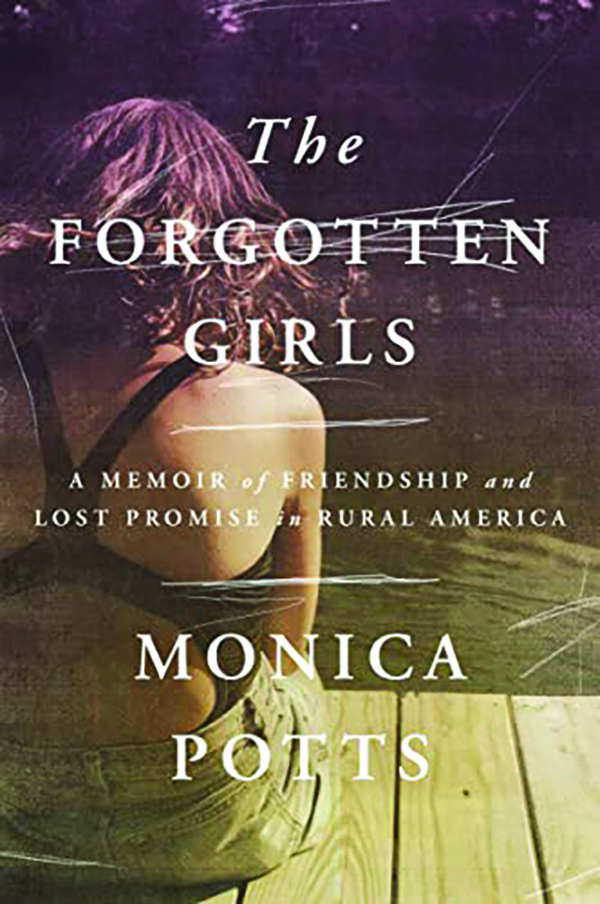
The data-driven confusion of The Forgotten Girls
Tim Rice
Criticizing a memoir is an odd task. It’s like if someone told you they’d just been pelted with rotten tomatoes and you criticized the stain on their shirt. It’s not like they asked to become a human French fry, and it makes perfect sense that they would want to share such a wild story. But Monica Potts’s The Forgotten Girls is not just, as its subtitle promises, “A Memoir of Friendship and Lost Promise in Rural America.”

Potts, a senior politics reporter at FiveThirtyEight, infuses her tale of growing up in rural Arkansas with enough social science research to choke a graduate student. The book frequently veers from memoir into data-driven critiques of the politics and religion of her hometown, only to lurch back into autobiography before Potts has a chance to offer thoughts on a solution to the socioeconomic problems she identifies. The result is a frustratingly inconsistent book, which buries an honest and evocative story of female friendship and life’s bitter injustices beneath what often feels like an effort to expand on Barack Obama’s quip that rural people are ignorant brutes who “cling to their guns and their religion.”
MERCY STREET: WHEN ROCK AND ROLL MADE YOU READ BOOKS
To her credit, Potts seems to be grappling with her affection for her hometown, where she now resides, and her rejection of the lifestyle embraced by her neighbors. But that internal struggle can only explain so much — because The Forgotten Girls is not just Potts’s story about how she got hit with a rotten tomato; it’s her attempt to throw them.
The Forgotten Girls is as much Potts’s memoir as it is a biography of her childhood best friend, Darci. Equally intelligent and driven to escape their hometown as girls, Monica and Darci eventually take different paths: the former to elite universities and a career in journalism, the latter to a life of unwed motherhood and addiction all too common in their Arkansas hometown. After reconnecting with Darci in 2015, Potts made it her goal to determine why so many women get stuck in towns like theirs, Clinton, in an effort to explain why her life played out so differently from her friend’s. The Forgotten Girls is the result of this yearslong study, helpfully divided into two sections: “Causes” (“Church,” “Trauma”) and “Effects” (“Motherhood,” “The Downward Spiral”).
Potts’s analysis won’t come as a shock to anyone familiar with the plight of rural America. She attributes her success to a relatively stable home life, an attentive mother who made sure she worked hard in school, and, crucially, the fact that she largely avoided sex, drugs, and alcohol in high school. Darci, meanwhile, had parents who let her get away with everything, which included the youthful drug use and promiscuity that led directly to her becoming pregnant and dependent on drugs by the time she turned 21.
Time after time, Potts shows how the key to her success was a combination of hard work, education, and personal responsibility. When she discusses her own path out of Clinton, Potts sounds awfully similar to Sen. J.D. Vance, who offers much the same narrative in his bestselling 2016 memoir, Hillbilly Elegy. But while Vance uses his experience to critique federal welfare programs and argue for structural changes to the American economy, Potts refuses to acknowledge the importance of personal responsibility outside of her own life. Rather than explain Darci’s struggles by showing how she chose poorly, Potts attempts to blame Darci’s destructive behavior on the oppressive societal expectations forced on women in rural America by the white male Christian conservatives who want to exploit and oppress them.
It would be unfair to say that Potts is just engaging in a standard progressive critique of “real America.” For one thing, she both hails from and lives in the place she is scrutinizing, a connection and commitment that gives her some standing. Moreover, her analysis is often correct. The book’s best chapter details the sexualization of young girls by grown men in the community and the willingness of their parents to countenance these inappropriate relationships, which is as backward and condemnable as Potts suggests. This nuance makes Potts’s visceral dislike of her neighbors’ politics and religion all the more vexing. She reports that local churches hold multiple weekly services and host summer camps for children as if she’s revealing the secrets of a cult compound, not relatively standard church offerings. “When faced with any disaster,” she notes derisively, “the voting people of Van Buren County … largely doubled down on their conservatism, religiosity, and isolationism.”
Curiously, it’s precisely the qualities generally promoted by conservatism and religiosity that Potts credits with her own escape. She suggests that Darci was doomed to fail once the moralistic parents and teachers of Clinton wrote her off as having “crossed the unspoken line between rowdy redneck and college-bound scholar.” But Potts also notes that it was her own “severe” judgment of girls like Darci, bolstered by her mother’s own insistence that she led a chaste, sober life, that helped her succeed.
Potts seems to suggest that her judgmental behavior, while no different from that of the teetotalers at the First Baptist Church, is better precisely because she isn’t religious. She takes pains to note that she was “liberal for the town, less concerned with enforcing a moral code.” She likewise mentions that her mother hates the town’s embrace of Donald Trump, a detail utterly ancillary to a memoir largely set in the 1990s, because it “combin[ed] two things that tormented my mother: conservative politics and evangelical religion.”
Herein lies the somewhat absurd argument at the heart of The Forgotten Girls. Potts convincingly argues that by avoiding vice and working hard, you can beat the odds and escape poverty — but only if you’re smart enough to brush aside the religious and political traditions that generally impart these lessons. You need to be as suspicious of prayer as you are of booze and sex. You have to believe in self-determination and personal responsibility but scoff at anyone who embraces rugged individualism.
For most of the book, Potts comes across as either arrogant or hypocritical. But after the book’s raw final chapters, which find Potts back home, struggling to save Darci from herself, it’s hard to see her that way. Instead, it seems like she’s making desperate attempts to explain the unexplainable. For people like Potts, who have built their life around the ability of data to explain and perfect everything from online poker to presidential primaries, confronting the limits of the empirical can be jarring. People who rely on data to explain the world may say they want empirical truth. But more often than not, they just want empirical support for comforting ideas. Potts’s boss, FiveThirtyEight founder Nate Silver, recently acknowledged as much, telling the New Yorker that the site’s liberal readers felt betrayed when the data stopped predicting Democratic victories.
Quantifying unfairness doesn’t make it any less unfair, and understanding why someone got caught in poverty doesn’t make it easier to pull them out of it. The Forgotten Girls makes this harsh truth very clear, though Potts can’t bring herself to say it outright. Instead, she remains firmly split between memoir and analysis, refusing to land entirely on one side.
CLICK HERE TO READ MORE FROM THE WASHINGTON EXAMINER
Tim Rice is associate editor of the Washington Free Beacon.
